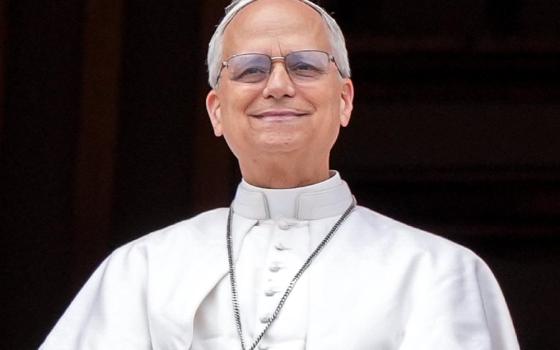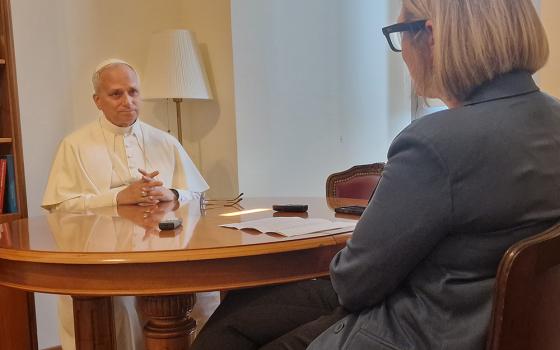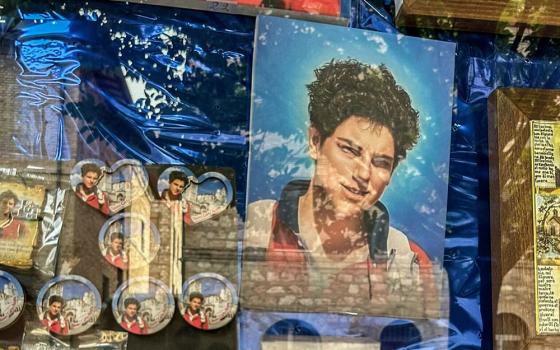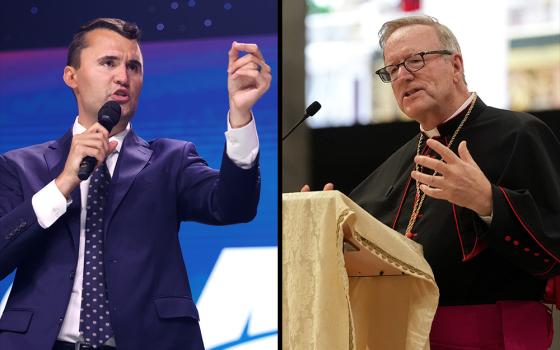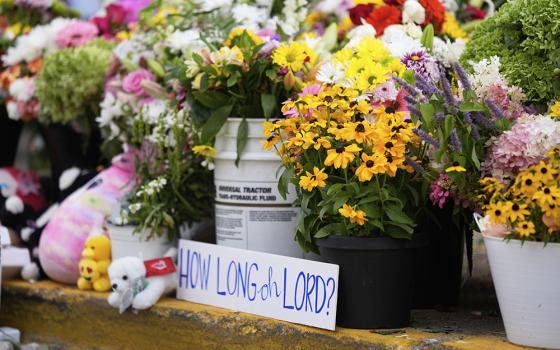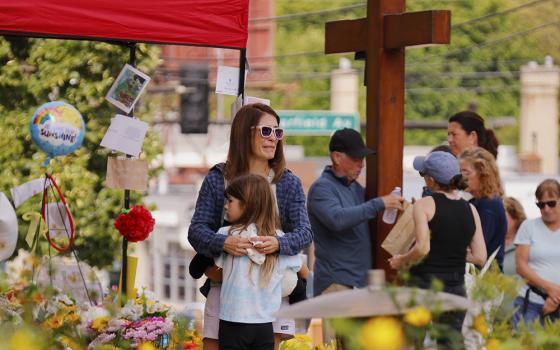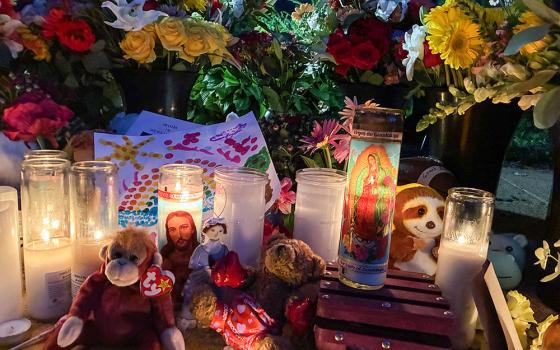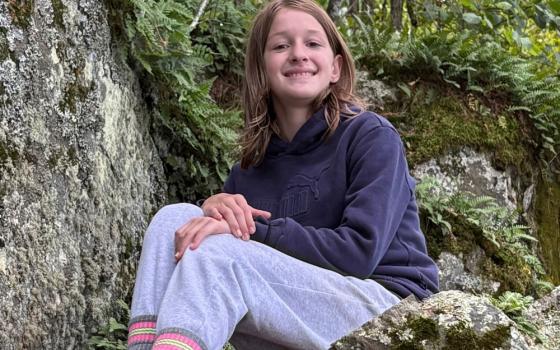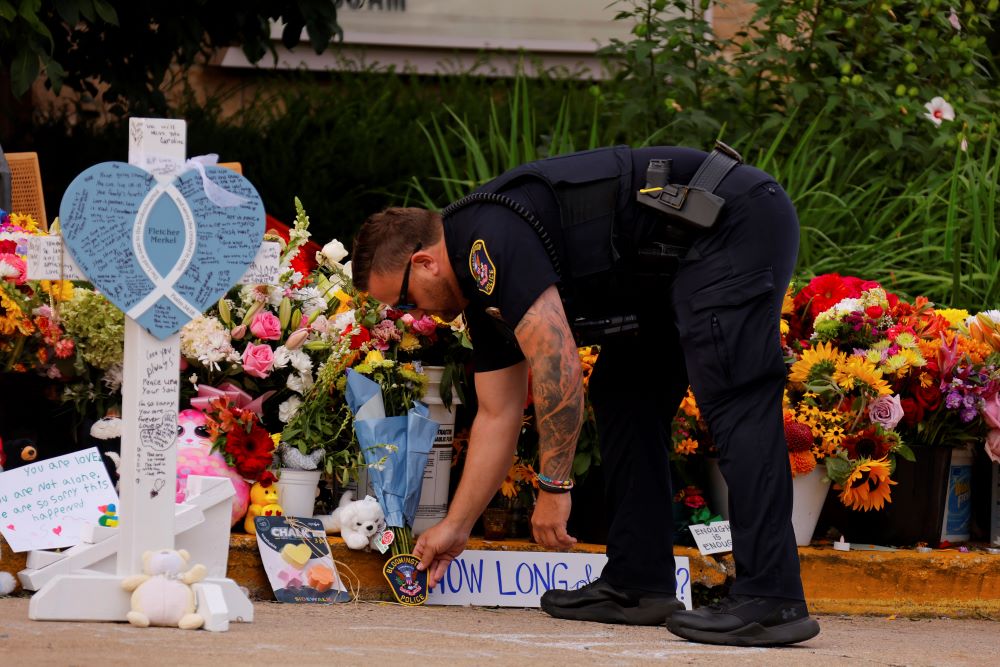
A police officer places a patch at a makeshift memorial at Annunciation Catholic Church after the Aug. 27 fatal shooting at the school Aug. 29 in Minneapolis. (AP/Bruce Kluckhohn)
U.S. Catholic bishops offered the usual and uncontroversial condolences and prayerful solidarity in the wake of the deadly Aug. 27 Minneapolis church shooting that killed two children and wounded 18 others.
The statements were mild compared to comments from Pope Leo XIV on Sunday (Aug. 31) and two archbishops who stood out from most of the U.S. bishops.
"We hold in our prayers the countless children killed and injured every day around the world," Leo said. “Let us plead God to stop the pandemic of arms, large and small, which infects our world."
Leo spoke in English, making his first comments on gun control since becoming the first U.S. born pope. Leo's comments follow strong statements from the archbishops of Chicago and Detroit. While echoing the prayers and condolences, Chicago Cardinal Blase Cupich and Detroit Archbishop Edward Weisenburger clearly believed that was not enough.
Cupich and Weisenburger called for new measures to combat gun violence by reducing access to the types of high-velocity rifles and handguns that have repeatedly been used in school shootings across the country.
"The facts are clear," Cupich said in a prepared statement. "Guns are plentiful and common sense attempts to limit their availability have been largely rejected in the name of a freedom not found in our constitution,"
Weisenburger said, "Even as we pray for those whose lives were taken today, I also ask that our prayer be matched by firm endeavors to end the superabundance of handguns and assault weapons in our great nation. We owe it to our families, our neighbors, and our friends. But most of all, we owe it to the children,"
Chicago reported 224 fatal shootings so far this year, and 346 in 2024. It reported 1.236 total shootings so far this year, and 1,994 in 2025. Detroit reported 606 nonfatal shootings in 2024, down 25% from 2023 and down 48% since 2020.
Cupich and Weisenburger were in the minority. Most Catholic diocesan leaders avoided delving into the gun control debate and generally are far more reticent to weigh in on guns than they are on other life issues, such as abortion.
The U.S. Conference of Catholic Bishops, which has in the past called for strong gun-control measures, also pulled its punches. Speaking on behalf of the U.S. Conference of Catholic Bishops, Baltimore Archbishop William Lori, the conference vice president, issued a tepid three-sentence statement in which he said the church was following the news "with heartbreaking sadness."
But earlier bishops' statements have been direct in calling for policy changes that will limit access to guns.
In 2019, for example, Bishop Frank Dewane of Venice, Florida, chairman of the Committee on Domestic Justice and Human Development, decried gun violence in an address to the General Assembly of Bishops in Baltimore.
Bishop Frank Dewane of Venice, Fla., speaks about gun violence during the 2019 fall general assembly of the U.S. Conference of Catholic Bishops. (CNS/Bob Roller)
Dewane noted that the conference had previously called for a ban on assault weapons, universal background checks, a federal gun trafficking bill, regulations on sales of handguns, and improved mental health interventions.
He also called on the bishops to support "red flag laws" — which allow courts to temporarily remove firearms from people deemed a danger to themselves or others — and licensing handguns.
In 1994, the U.S. bishops issued their pastoral message, Confronting a Culture of Violence: A Catholic Framework for Action. The bishops stated, "We have an obligation to respond. Violence -- in our homes, our schools and streets, our nation and world -- is destroying the lives, dignity and hopes of millions of our sisters and brothers."
The bishops' conference supported the 1994 Assault Weapons Ban, which expired in 2004. "We have to address simultaneously declining family life and the increasing availability of deadly weapons, the lure of gangs and the slavery of addiction, the absence of real opportunity, budget cuts adversely affecting the poor, and the loss of moral values," the bishops said in a 1994 pastoral letter.
In a 1990 document "New Slavery, New Freedom: A Pastoral Message on Substance Abuse," the bishops cited their 1975 call for the "eventual elimination" of guns from American society.
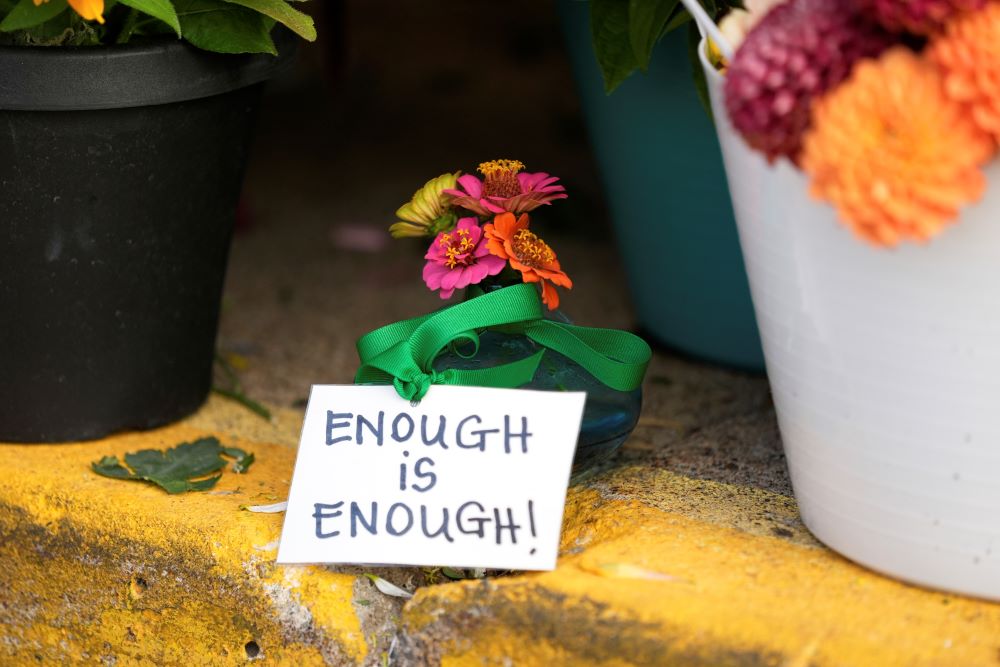
A sign stands amid flowers at a memorial at Annunciation Catholic Church after the Aug. 27 fatal school shooting Aug. 28 in Minneapolis. (AP/Abbie Parr)
The dissonance between previous strong statements about gun safety and the bishops' tepid response to the Aug. 27 fatal shooting did not go unnoticed by Catholics who advocate for gun-control legislation.
"I think the bishops should be more forceful on this issue, and priests too," said St. Francis of Philadelphia Sr. Maria Orlandini, serves as director of advocacy for the Franciscan Action Network.
Orlandini, whose advocacy work focuses in part on gun violence prevention, told the National Catholic Reporter that the Catholic Church in general does not prioritize addressing gun violence, which she noted is the leading cause of death for children and teens in the United States.
"I think we need to make gun violence part of our pro-life program," Orlandini said. "When we speak out about being pro-life from the pulpit, I think gun violence needs to be on the same level as abortion."
The bishops in 2023 affirmed abortion, not gun violence, as the"preeminent priority" for their political guidance to Catholic voters leading up to the 2024 presidential election.
"When we speak out about being pro-life from the pulpit, I think gun violence needs to be on the same level as abortion."
—Sr. Maria Orlandini
Typical of the bishops' responses were posts on social media and statements offering prayers for the victims as they called upon the faithful to also pray and mourn with the devastated families and Catholic school community in Minnesota.
"We pray seeking healing for the wounded, strength for the bereaved, and peace for the students who died while gathered with their classmates in prayer," Boston Archbishop Richard Henning said in a one-paragraph statement.
"We commend the victims to the mercy of Christ, who alone can heal broken hearts, and I ask the faithful here in New Jersey to stand with them in prayer and solidarity," Newark Cardinal Joseph Tobin said.
A few bishops referred to gun violence without offering their thoughts on what public policies lawmakers should enact.
"While debate will follow in many circles about various strategies to prevent a repetition of this crime in other places, including the areas of mental health and regulation of firearms, these are ancillary to the primary issue of good versus evil," Fort Worth, Texas, Bishop Michael Olson said in his prepared statement.
"We join in compassionate solidarity with the countless families of the city of Minneapolis, Annunciation Catholic School, and beyond who have been touched by an unthinkable grief caused by mind numbing gun violence which has become all too common," said a statement from New York Cardinal Timothy Dolan. "We pray for an end to all violence in our hearts, in our communities, and in our world."
Often outspoken on issues such as abortion, and increasingly on migration amid the Trump administration's crackdown on illegal immigration, U.S. Catholic bishops have been reticent to offer very specific guidelines and policy responses on some moral and social issues, said Massimo Faggioli, a theologian and church historian at Trinity College Dublin.
"On the particular issue of gun violence there is visible reluctance among many Catholic bishops to talk about gun control," said Faggioli who has studied and written about the American episcopate. "It's something that we have seen already when it's about the future of democracy in the USA."
Faggioli called it an "intellectual paralysis."
The absence of calls to control firearms contrasts with the bishops conference's support of the 1994 federal Assault Weapons Ban. The conference testified in favor of banning those types of weapons again after the Dec. 14, 2012, massacre at Sandy Hook School in Newtown, Connecticut.
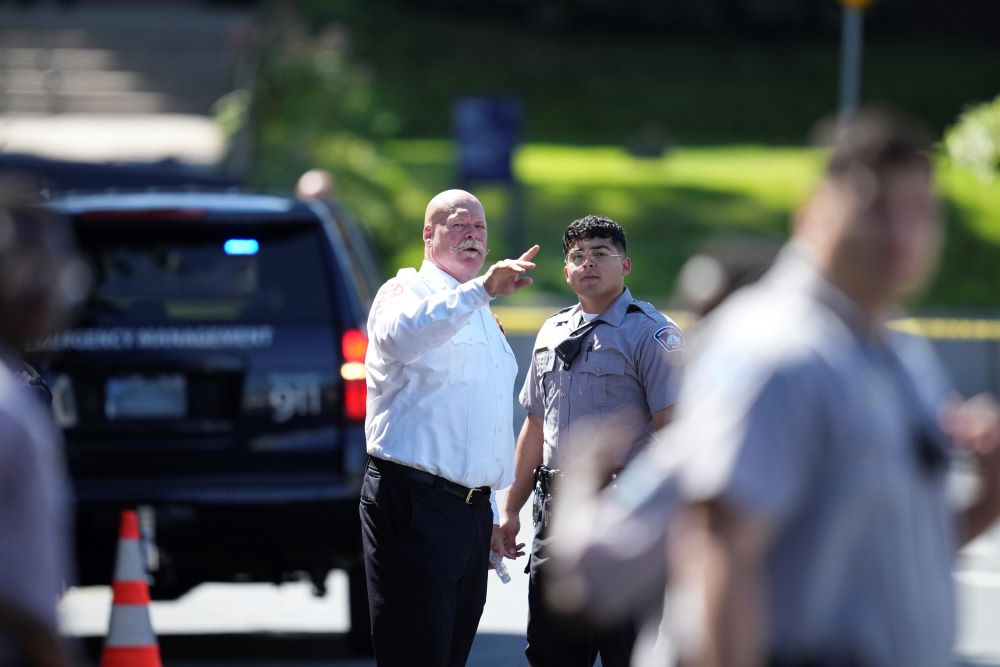
Law enforcement officers gather outside the Annunciation Church's school in response to a reported mass shooting Aug. 27 in Minneapolis. Two children were killed, 18 people were injured, and the shooter died from a self-inflicted gunshot. (AP/Abbie Parr)
And some dioceses and parishes across the country have posted resources and toolkits for addressing gun violence on their webpages. The St. Louis Archdiocese created a task force on gun violence, which sponsored a summit on the issue in 2023.
"I hope every diocese and archdiocese would do likewise," said Tobias Winright, a moral theologian at St. Patrick’s Pontifical University in Maynooth, Ireland, who previously taught at St. Louis University.
His daughter attended Central Visual and Performing Arts High School in St. Louis when a school shooting there in October 2022 resulted in the deaths of a 15-year-old student and teacher, and left seven others wounded. Winright said his family is still affected by the incident.
"Thoughts and prayers of friends mean something, but more is needed to minimize the likelihood of such school shootings in the future. I wish archbishops and bishops would do more than offer their thoughts, prayers, and condolences," said Winright, who praised Cupich and Weisenberger for their statements.
"Regarding prayer, I like how [Cupich] does not limit it to the victims and their loved ones but also directs it towards policymakers who need courage to support change," Winright said.
Advertisement
Megan Walsh, a law professor who serves as director of the Gun Violence Prevention Clinic at the University of Minnesota, said that the country needs "moral leadership that speaks with courage about the need for sensible gun laws and policies" that she said will save lives.
"Anything less falls short of our faith's call to pursue peace and justice and protect the vulnerable, especially our children," said Walsh, who is Catholic and said her faith motivates her to work to end gun violence.
"As Catholics, we are called to defend human dignity and protect the most vulnerable," Walsh said. "That must mean taking real, concrete steps to support stronger gun laws that will prevent the scourge of gun violence that devastates our schools, families, and parishes like Annunciation. As the principal of Annunciation School said, 'when you pray, move your feet.' "

